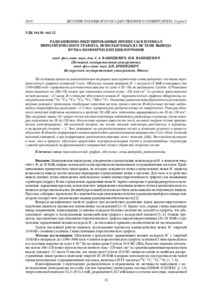Please use this identifier to cite or link to this item:
https://elib.psu.by/handle/123456789/24192| Title: | Радиационно-индуцированные процессы в пленках пиролитического графита, используемых в системе вывода пучка коммерческих циклотронов |
| Authors: | Вабищевич, С. А. Вабищевич, Н. В. Бринкевич, Д. И. |
| Other Titles: | Radiation-Induced Processes in Pyrolitic Graphite Films Used in the Commercial Cyclotron Beam Output System |
| Issue Date: | 2019 |
| Publisher: | Полоцкий государственный университет |
| Citation: | Вестник Полоцкого государственного университета. Серия C, Фундаментальные науки. - 2019. - № 12. - C. 32-36. |
| Abstract: | Исследованы процессы взаимодействия отрицательно заряженных ионов водорода с пленками пиролитического графита толщиной 3 мкм. Облучение ионами водорода Н с энергией 18 МэВ в интервале доз 1500–5000 мкА·ч проводилось в остаточном вакууме не хуже 4·10-4 Па на циклотроне Cyclone 18/9 циклами длительностью по 100–120 минут при плотности ионного тока ~320 мкА·см-2 со средним промежутком между циклами ~22 часов. В γ-спектрах облученного ионами Н пиролитического графита обнаружены линии радионуклидов 57Ni, 55Co, 56Co, 57Co, 58Co, 54Mn и 51Cr. Указанные радионуклиды образуются в результате ядерных реакций с протонами стабильных изотопов железа, хрома и никеля. В облученных пленках наблюдались микродефекты размерами ~1–5 мкм, неравномерно распределенные по поверхности. Размеры областей скоплений дефектов находились в пределах 50–200 мкм, плотность варьировалась от 10 до 150 мм-2. При нагрузках свыше 10 г вокруг точки касания индентора наблюдались радиальные трещины, длина которых изменялась от 50 до 150 мкм. Количество трещин зависело от того, на какой стороне пленки производилось индентирование. На вогнутой стороне от точки касания индентора расходились 4 трещины, а на выпуклой стороне – 3. Это указывает на рекристаллизацию пленки в алмазную решетку в процессе облучения. В области деформаций сжатия происходит кристаллизация в направлении (111) с более плотной атомной упаковкой, а при деформациях растяжения упаковка менее плотная (100). Это свидетельствует о том, что в процессе облучения происходит перекристаллизация пленок в алмазоподобные структуры с разной ориентацией на фронтальной к направлению пучка и обратной сторонах пленки.= Interaction between negatively charged hydrogen ions and 3 microns pyrolytic graphite films was investi-gated. Irradiation with 18 MeV H¯ ions in the dose range of 1500–5000 μAh was carried out in a residual vacuum no worse than 4·10–4 Pa on the Cyclone cyclotron of 18/9. Irradiation cycles had the duration of 100–120 minutes, ion current density ~320 μA·cm-2 and average time between cycles ~22 hours. The identification of γ-emitting radio-nuclides and the determination of their activity were performed using the spectrometer on highly pure germanium: GEM40-83/DSPEC jr 2.0 detection system; energy range 14,5–2911,4 keV; resolution 0,182 keV/channel. Indenta-tion was carried out at room temperature on a PMT-3 instrument using the standard procedure. In the γ-spectra of pyrolytic graphite irradiated with H+ ions, lines of nickel 57Ni, cobalt 55Co, 56Co, 57Co, 58Co, manganese 54Mn, and chromium 51Cr were observed. The dominant radionuclide was 51Cr with a half-life of 27,7 days. These radionuclides are formed as a result of nuclear reactions with protons of stable iron isotopes (56Fe, 57Fe, 58Fe), chromium (52Cr, 53Cr, 54Cr) and nickel (58Ni). Microdefects appear in irradiated pyrolytic graphite films – dark spots ~1–5 μm in size. They are unevenly distributed over the surface – there are areas of their clusters and relatively clean areas. The sizes of the areas of defects accumulations were in the range of 50–200 μm, the density varied from 10 to 150 mm–2. At loads over 10 g around the tangency point of the indenter, long radial cracks were observed, the length of which varied depending on the load from 50 to 150 microns. The number of cracks depended on the side of the film on which the indentation was made. On the concave side from the tangency point of the indenter 4 cracks diverged, and on the convex side – 3. This indicates the recrystallization of the film into the diamond lattice during the irradi-ation process. In the region of compression deformations, crystallization occurs in the (111) direction with a more dense atomic packing, and during tensile deformations, the packing is less dense (100). |
| Keywords: | Государственный рубрикатор НТИ - ВИНИТИ::ЕСТЕСТВЕННЫЕ И ТОЧНЫЕ НАУКИ::Физика Пиролитический графит Облучение Ионы водорода Радионуклиды Pyrolytic graphite Irradiation Hydrogen ions Radionuclides |
| URI: | https://elib.psu.by/handle/123456789/24192 |
| metadata.dc.rights: | open access |
| Appears in Collections: | 2019, № 12 |
Items in DSpace are protected by copyright, with all rights reserved, unless otherwise indicated.
